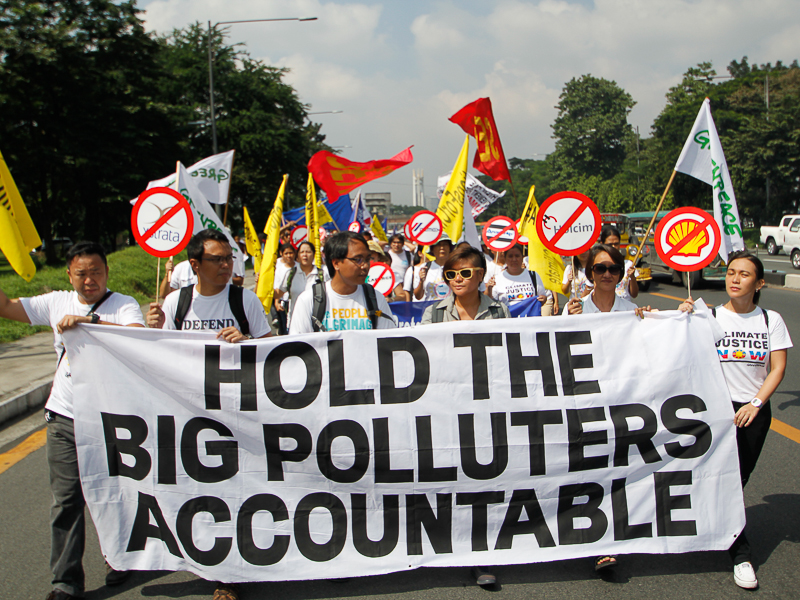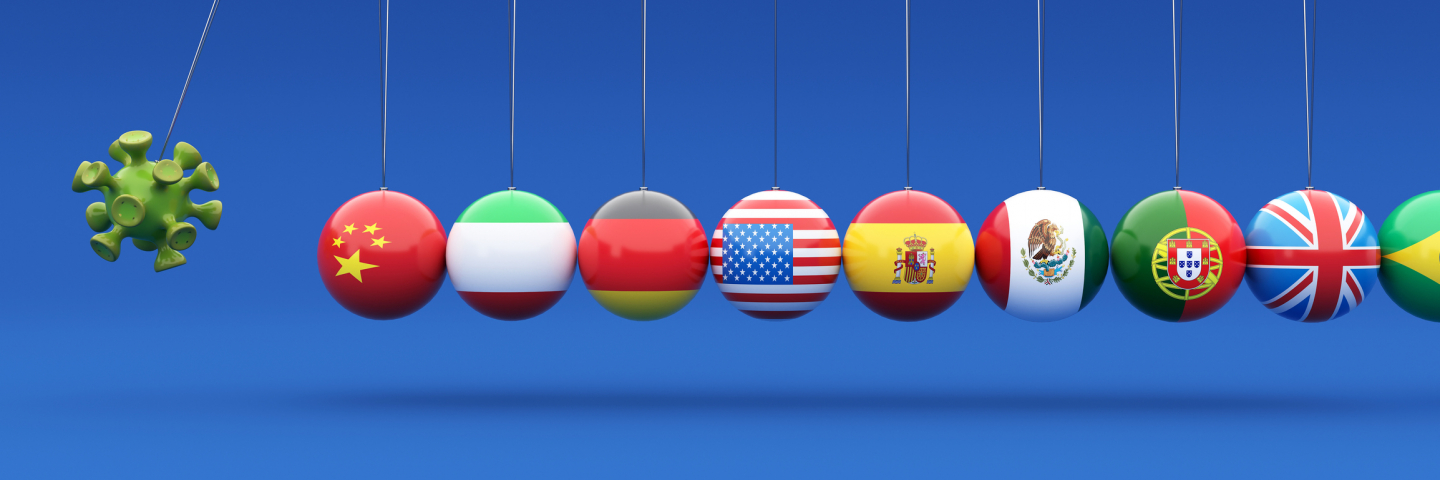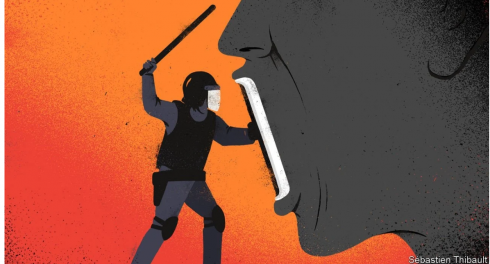Highlight
- Climate – Accountable. Why the dissonance?
- COVID crisis = governance crisis
- Empty out your pockets
- Control the machine
- Data in action
- Evaluation excitement (yes, you read that right)
- TAI Spotlight: 10 lessons for funders and partners considering the GPR
Climate – Accountable. Why the dissonance?

Photo Credit: AC Dimatatac
We start this week with the climate crisis and with the push for more transparent and, above all, accountable climate finance systems. A new paper from the World Resources Institute makes clear the critical roles civil society organizations can and must play on this agenda. (Kudos for creating the 2 page brief for those short of time.) Read alongside Oxfam’s “Climate Finance Shadow Report. Michael Igoe details how climate finance could be diverting from development assistance although lags in reporting prevent us from knowing the extent of climate financing and if high-income countries are meeting their climate finance commitments.
What of holding business to meaningful change? Intriguing to see the launch of a campaign to get PR firms to stop working with fossil fuel firms, while Jacqui Germain argues that a rush of donations to green causes should not exempt Jeff Bezos from accountability for environmental impacts of Amazon’s business empire.
More depressing to read that environmental, social and governance issues appear to be taking a back seat in the decisions of the world’s biggest investment firms amid COVID, despite rhetoric to the contrary.
Essential Listening #1: What Cote d’Ivoire and Senegal can teach us about leaving office gracefully
Marc-Andre Boisvert and Ambika Samarthya-Howard discuss peaceful electoral transition and local civil society activism in Senegal and Cote d’Ivoire
COVID crisis = governance crisis

Photo Credit: Marshall Center
Staying big picture UNCTAD emphasize the need for development funding and trade to be more transparent to stop world division post-COVID-19, calling for a new, “Marshall plan,” which could include elements such as accelerated digitalization and redoubled efforts to get SDG progress back on track. For context, this World Bank interactive data visualization tool tracks the progress of the SDGs amid COVID-19 impacts. Certainly, international humanitarian fund has been constrained – funding of emergency response appeals sits at just 44.1%, lagging behind the 63% funding level in 2019.
Jairo Acuña-Alfaro lays out 7 ways that COVID-19 is now a governance crisis in the Latin America and Caribbean region, but is hopeful this can force changes to the rules of the game to reduce grotesque inequalities and create equal opportunities for all citizens, a point emphasized by Ginette Azcona and Antra Bhatt as they push for gender justice to be prioritized post-pandemic.
What of the rights of indigenous peoples? Joy Aceron walks us through the lessons of creating “sectoral bodies” in the Philippines – designed to institutionalize representation of marginalized sectors in governance. Are they fulfilling their purpose?
Want some inspiration for governance innovation? This year’s all digital Paris Peace Forum is a good place to start – get a sense of proceedings via the twitter thread. Yes, world leaders still turned up as did 12,000 participants across 178 sessions/pitches. Bound to be something that intrigues you.
Essential Listening #2: Laos and the Chinese debt crisis in Africa
Kelly Wanjing Chen talks Chinese debt and how a swamp of debt for equity in a state owned power company might offer insights for how China will approach debt renegotiations in Africa
Empty out your pockets
Of course, many world leaders are preoccupied with economic recovery. Zambia’s debt default offers a cautionary tale to other distressed economies, after lenders reject their debt relief request. No surprise that the government is cracking down on freedoms in parallel with harassment of opposition activists, journalists, and artists ahead of an election to come.
Zambian leaders might have some hope after G20 leaders agreed to an extension of the debt service suspension initiative through the first half of 2021 at a virtual summit this past weekend. They also recommitted to tax transparency and fighting corruption. Read their statement in full. However, is it just us or are these starting to feel like rote statements at this point?
One solution to meet debt obligations is to raise more revenue and on that front Tax Justice Network’s State of Tax Justice 2020 suggests a rethink of tax arrangements is long overdue. They claim $427 billion is lost to tax havens each year – equivalent of nearly 34 million nurses’ annual salaries, and reflecting illicit flows of more than $1.8 trillion each year. No wonder a recent global panel discussion focused on the importance of global advocacy of tax transparency and the direction, quality and development of policy interventions.
Not that international loopholes should be the only priority. Paul Lewis makes the case for why income from wealth should be taxed the same way as income from work. Hard to argue. The FACT Coalition lays out six recommendations to the Biden-Harris transition team on fostering financial transparency and tax fairness.
What of revenues from natural resources? A Publish What You Pay investigation has revealed that two massive oil and gas field projects in Kazakhstan backed by European energy corporations has had a negative impact for the surrounding community and indeed few public benefits.
To aid more coverage of such investigations, the Natural Resource Governance Institute’s latest tool, Covering Extractives – an online guide to reporting on natural resources, aims to help journalists report on national and cross-border issues in the oil, gas, and mining sectors.
Looking to another societal challenge, Rowan Philip offers these tools and tips for journalists on gathering and analyzing evidence on police misconduct.
Essential Watching: Winning the fight for tax justice
How do we make multinationals pay? Watch this Tax Justice Network’s animation on how multinationals shift their profits to dodge their taxes and how we can stop them.
Control the machine
TAI is looking forward to a conversation on governance of artificial intelligence (AI) next week and so was intrigued to read Gillian Tett’s concern over opacity around growing use of AI in the finance sector while Tim Maurer and Arthur Nelson offer a vision for how the international community can better protect the financial system against cyber threats.
Meantime, John Donovan at MIT Technology Review argues that fair content moderation decisions are key to public accountability and less-than-transparent social media companies practices leave them open to claims of censorship and hide the cost of misinformation.
Discover how you can protect your presence online with this cybersecurity assessment tool designed to measure the maturity, resiliency, and strength of an organization’s cybersecurity efforts.
Data in action
Turning to the positives of data, Deputy Director of Thailand’s Comptroller General’s Department, Pattaraporn Vorasaph lays out how open data can help to cut infrastructure costs, while Jim Anderson argues that open data and designing effective policies and programs on information gathered can help end corruption.
The scale of that tasks is illustrated by the Africa Centre for Open Governance report on state capture and “budgeted corruption” in Kenya, but a sense of potential is revealed by the “Hot Feet” platform that enables anyone to see the links between politically exposed persons in Lithuania and government spending. Admirably holding feet to the fire.
As the world is rightly excited by positive COVID-19 vaccine developments, Jonathan Cushing reminds us of the huge challenges that production and distribution will present, not least due to corruption risks.
Evaluation excitement (yes, you read that right)

It’s time to get serious about tackling the global evaluation capacity gap according to those behind the new Global Evaluation Initiative. We’re excited by their mission to help “create a world where evidence is used to increase transparency and make better decisions to improve lives.” Experts weigh in on the significance of this partnership in closing the global gaps in monitoring and evaluation capacities for better evidence in decision making.
Also, don’t miss this fascinating Twitter thread on alternatives to KPIs in terms of what funders ask grantees to report to.
Finally, find out how your organization can improve on remote work best practices.
TPA Full Disclosure –People behind TPA: Isabelle Kermeen on dismantling misconceptions – “Put yourself out there”

How can funders and grantees bring their work to life and demonstrate the impact of what they are doing on the field? Integrity Action’s Communications Manager, Isabelle Kermeen, shares tips, trends, and opportunities around nonprofit communication strategies and common mistakes to avoid as we work to bridge the gap and build a better civil society.
TAI Spotlight: 10 lessons for funders and partners considering the GPR
10 lessons learned for funders and partners considering the Grantee Perception Report | Luminate
Laura Bacon pulls back the curtain to share some lessons learned from the process of working on the Luminate’s Grantee Perception Report (GPR).
How Darren Walker and the Ford Foundation Reinvented Philanthropy for the Pandemic | Ford Foundation
The Wall Street Journal make the Ford Foundation President their 2020 Philanthropy Innovator – read why. Plus, the foundation’s BUILD initiative and Spring Strategies shares how changes spurred long-term grantmaking reforms.
Hewlett Foundation to award $15 million to groups combatting systemic racism | Hewlett Foundation
15 recipient organizations working across a range of issues—from health to education to human rights—to advance racial justice by centering Black communities will receive $15M toward advancing racial justice.
Europe Must Stand Up to Hungary and Poland | Open Society Foundations
Chairman of the Open Society Foundations, George Soros says the European Union (EU) cannot afford to compromise on fundamentals of democracy and human rights as Hungary and Poland EU’s seven-year budget and €750 billion recovery fund directly threatens the rule of law – and thus the bloc’s future. But is there the political will? Don’t miss the trailer and screen listing to the new documentary on George Soro’ life and public activism.
Women’s Health and Human Rights in Twenty-first Century Mexico | MacArthur Foundation
Discover how women’s movements and organized civil society in Mexico have advanced a policy agenda for the health sector.
Job Listing
- Global Fund for Community Foundations hiring Global Network Weaver – November 27, 2020
- Government Affairs Senior Policy Advisor, International Financial Institutions at Oxfam – Ongoing
- Data Architect at Open Data Institute – Ongoing
- Luminate Director, Africa – Ongoing
- Job postings at Hewlett Foundation – Ongoing
- Job postings at MacArthur Foundation – Ongoing
- Job postings at Open Society Foundations – Ongoing
- Job postings at Luminate – Ongoing
Job postings at Ford Foundation – Ongoing - Senior Policy Advisor for Civic Space at Oxfam America – Ongoing
Call/ Opportunities
- Call for evidence: From science to practice: Research and knowledge to achieve the SDGs – November 30, 2020
- Call for Media to Amplify Abolition – December 1, 2020
- World Justice Challenge 2021 – December 11, 2020
- Climate change and COP26 – Open call for creative commissions – December 13, 2020
- Governance and the COVID-19 Pandemic in the Global South, EGAP – December 15, 2020
- I-RAnT! Nigeria Influencing Grant – February 7, 2021
- Call for submissions to SSIR Series: Social change in an era of extreme polarization – Last Thursday of every month until early 2021
- USAID’s Development Innovation Ventures (DIV) grant funding – Ongoing
- BetterTogether Challenge for innovators – Ongoing
- Call for research proposals Tax and civil society – No Deadline
- Free Digital Security Training – Ongoing
- Open Road Alliance Charitable Grant and Loan to organizations responding directly to COVID-19 – Ongoing
- Pulitzer Center Coronavirus news collaboration challenge – Applications will be reviewed on a first-come, rolling basis
- Call for proposals: Informality, tax, and the state – Proposals accepted on a rolling basis
Calendar
- Tax for Development Webinar Series –December 1; December 15, 2020 (15:00 – 16:00 CET)
- Transparency International: 19th International Anti-Corruption Conference – December 1-4, 2020 (online)
- Racial justice in philanthropy: From transactional to transformational – December 2, 2020 (2-3 p.m. ET)
- A humanitarian rest: Impacts of a historic year – December 4, 2020 (9am EST)
- International Open Data Conference – Postponed till 2021
- Tips for Successful Online Meetings with Major Donors – December 10, 2020


